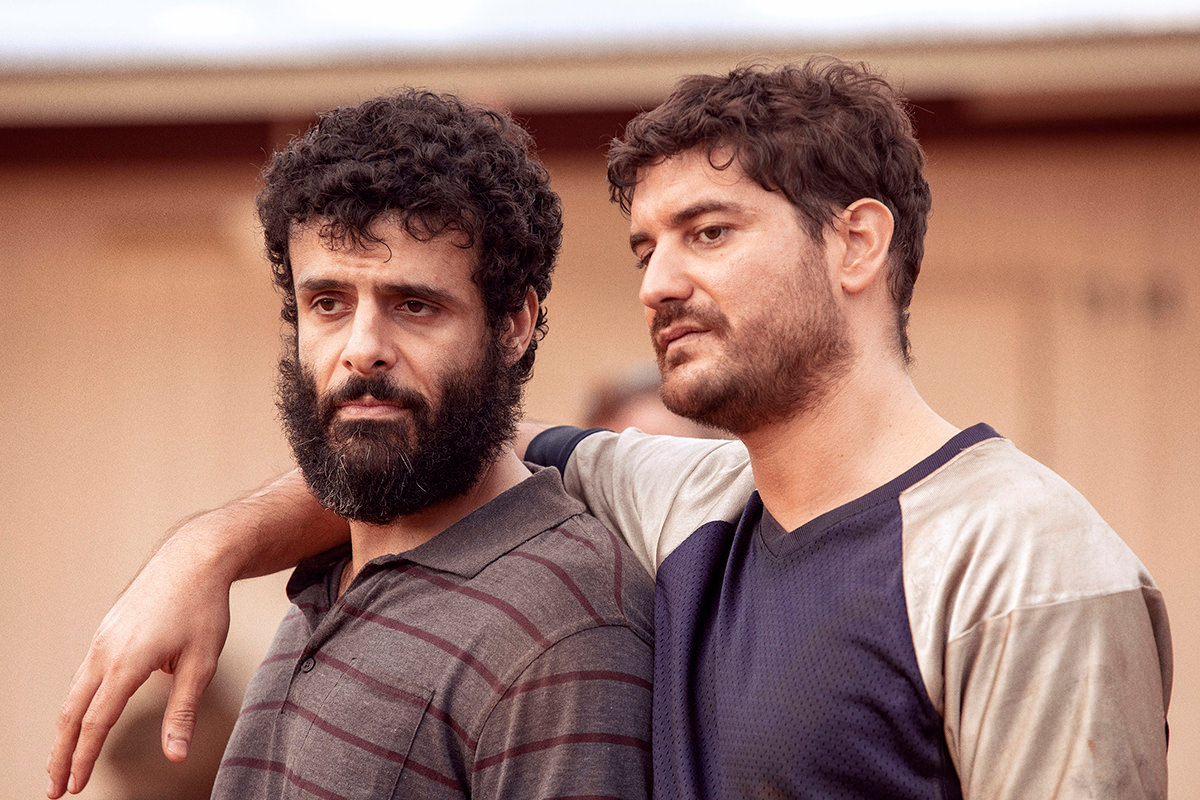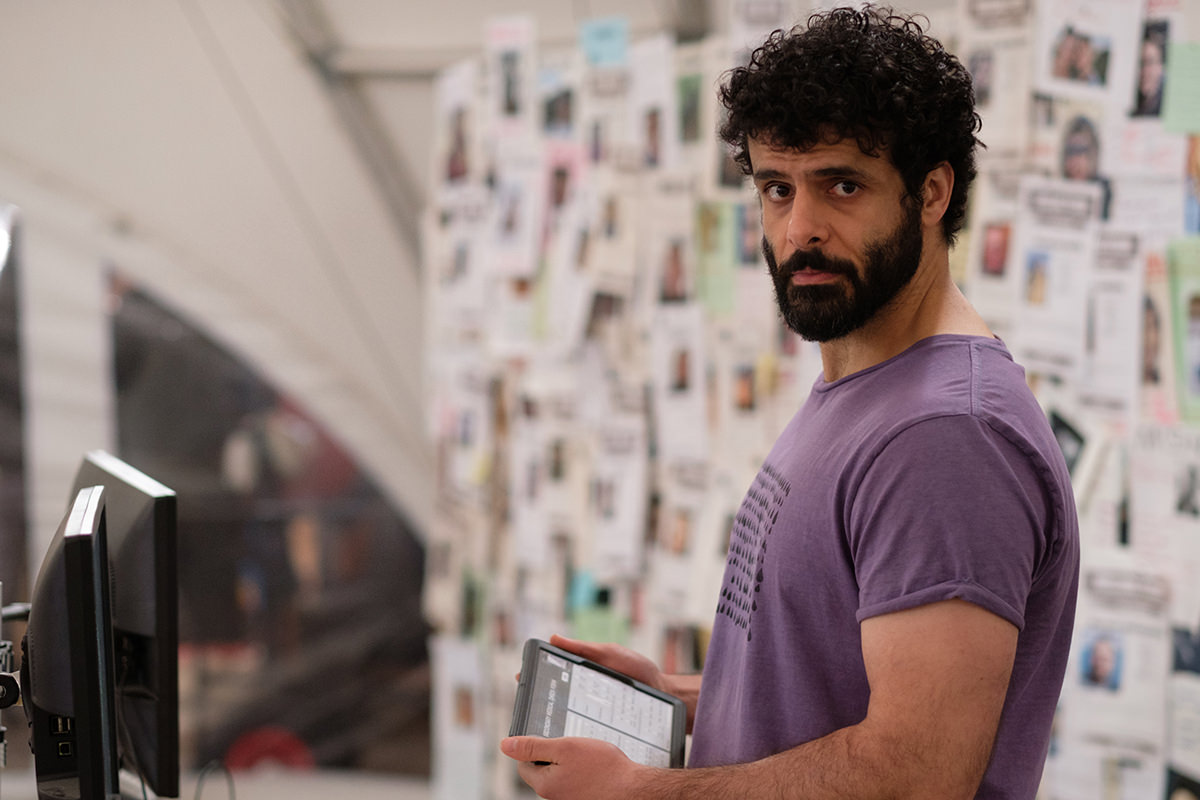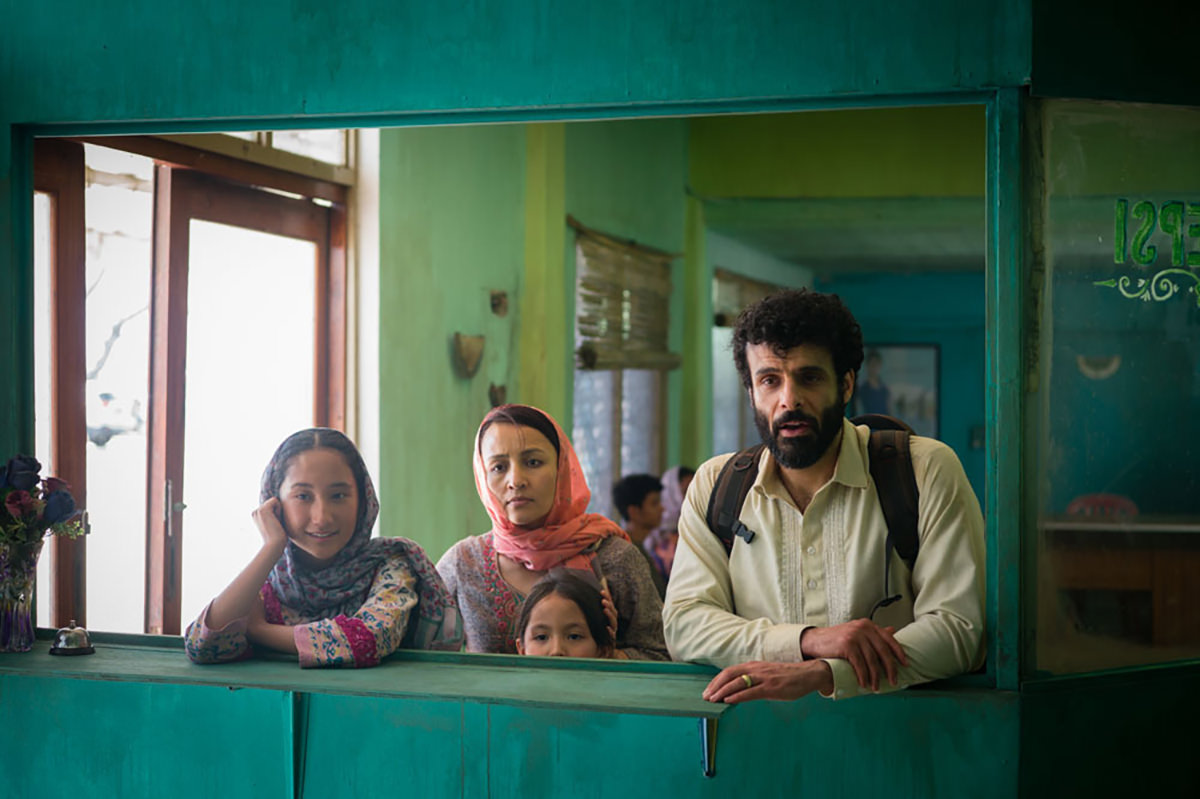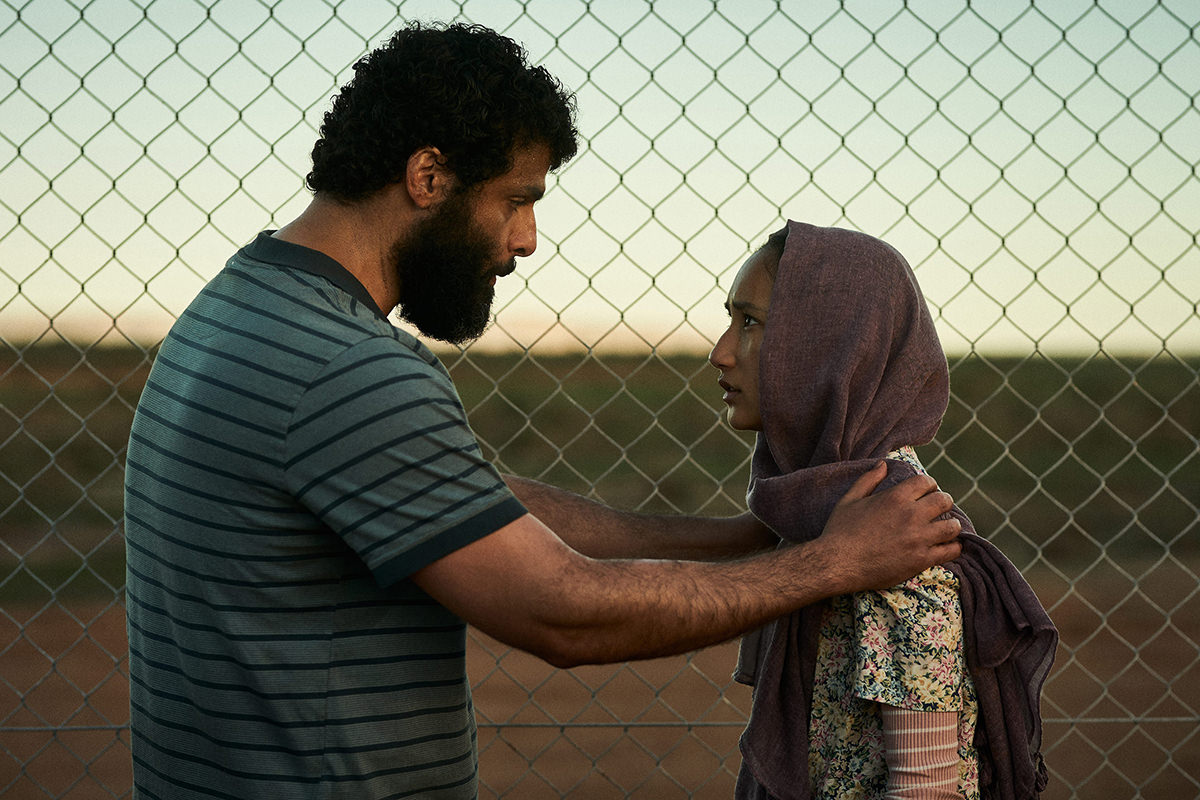Advice from Isolation: Fayssal Bazzi on acting and adapting
The Stateless actor reflects on pivotal career steps and the lessons they taught him.
 Fayssal Bazzi and Claude Jabbour in Stateless
Fayssal Bazzi and Claude Jabbour in Stateless
As we #StayHome to help combat COVID-19, members of the Australian screen sector share their career learnings in the Advice from Isolation series. Subscribe to Screen Australia’s newsletter for additions to the series.
I remember my dad saying to me after I’d finished three years of Drama school - “I’m happy for you to be an actor, but only if you make it work. I don’t want you to be a bar worker who acts, or a shop keeper who acts, either learn how to make it work on its own or do something else altogether”.
This was a frightening concept as an Arab man in his early 20’s.
I had stumbled into my acting life in the immediacy of post 9/11, with no other career reference point.
The world has changed a lot since then. Here are a few things I learnt as I tried to adapt and change along with it:
STARTING OUT
My career began in theatre. Fortunately, theatre affords you a lot more input in the creative process, so I was able to learn a lot about myself as an artist. My first three plays shaped how I would move forward in the industry. This Blasted Earth - A Christmas Miracle With Music was a masterclass of theatre-making and still to date is one of my most enjoyable times on a stage. I played John Lafayett - a not specific non-white actor who is cast to play a non-white role not matching his racial and cultural background (this was a comment on this type of practice in the industry at the time, which I was about to encounter).
The next play was Love Madness and Poetry - a cultural comparison crossing the tales of Layla and Majnoon (The Arab world Romeo and Juliet) and their English counterparts. It was on this play that I secured my first agent. She was a straight talker, would often tell me what to wear for auditions and was great with contracts. It would be my first connection to the world of screen and we would work together for more than 10 years.
The third play was called Cross Sections. It began at The Old Fitz, but was such a hit it had a return season at the Sydney Opera House. It was a fixed performance fee of $1,000 and was the first time I received money upfront for a theatre job instead of being paid through a ‘profit share split’, where the box office is divided up between cast and creatives.
These early years taught me about the importance of the arts community. Making connections and friendships with like-minded people and growing together in the industry. It also taught me that while I am an artist first and foremost, I am also a business. And I need to consider my business in decisions I would make throughout my career - an easy example is who you’re represented by. You and your agent need to have a shared vision of your business. You’re working together.
 Fayssal Bazzi in The Commons (Photo credit: John Platt)
Fayssal Bazzi in The Commons (Photo credit: John Platt)
THEATRE WAS MORE PROGRESSIVE THAN SCREEN
Screen auditions in the early to mid-2000s were not something I looked forward to. I’d get the casting, work on the script, picture myself in the role - then go into the room and be greeted by a sea of white actors going for the same role. I learned I was the darker option in case producers or networks wanted to go that way. Back then they never did, but I chose to keep doing them for the in-room experience. On the other side of the coin I was being sent for roles for any and all ethnicities. “Do you think you can do that accent?” was a weekly question and it didn’t surprise me there were still handfuls of white actors going for those roles too.
Early guest role experiences were an eye opening introduction to screen work. You needed to be on the ball (so do your homework), and also understand that what you would receive was the minimum needed to get you in and out as quickly as possible. The less drama or distraction you caused, the better: just do your job and be respectful to the process and you would be appreciated for doing so.
TACKLING SENSITIVE SUBJECT MATTER
While touring Australia with a play called Food, I was asked to put down an audition for a film called Down Under - a black comedy centring around the Cronulla riots.
The film follows two car loads of hoons in the aftermath of the riots - one car of white Australians (Alexander England, Damon Herriman, Justin Rosniak and Chris Bunton) and one of Arab Australians (Lincoln Younes, Rahel Romahn, Michael Denkha and myself) with both on a collision course for more trouble. Written and directed by Abe Forsythe, it was my first glimpse of how difficult it was to make a project involving sensitive cultural content. It was a 38 degree day and we were filming in Western Sydney. The scene would be my character D-Mac’s intro in the film, and I had to walk in to a chicken shop and spit out a rap in front of the customers and employees.
Three things happened.
Just before we started rolling, Abe received a phone call (unbeknown to anyone else) saying an investor had pulled out, meaning the film had lost a major part of its funding and might have to be shut down. He kept it to himself and continued on filming the scene. Shooting the scene itself posed its own problems due to location restrictions and blocking issues (including a difficult extra), so a number of takes were lost as we tried to problem solve.
And finally, on this steamy day between takes - one of the Muslim female extras, who was Muslim but hadn’t been accustom to wearing a full Niqab, lifted her veil to get some air and had been seen by a passing cleric, who gathered a group together and insisted we stop filming in the area for disrespecting their culture. Abe managed to strike a deal, so we could film for 30 more minutes, but after all that there was only one good take they could use. What became immediately clear, above all the chaos, was the respect and sensitivity you must have for anyone on-set or off that may be impacted (even through innocent actions).
The other day that stands out for me was when we were filming in Cronulla. Micheal and I were walking from the makeup truck to set when a car of actual hoons pulled up, blocked our way and started screaming “Aussie Aussie Aussie, Oi Oi Oi! Go home wogs!” then sped off. I found it mildly comical at the time given what we were doing there, but it also highlighted the importance of telling our own stories and why this film needed to be made.
 Stateless
Stateless
MAKING IT WORK
The Australian industry, both theatre and film, are small and opportunities can feel sparse, but the great flip side of that is people tend to look out for each other - both personally and professionally - especially when you have the reputation of doing the same.
A few weeks before leaving on a six-month national tour with Bell Shakespeare performing in The Merchant of Venice, I’d joined a round table read at Screen Australia which helped secure the funding of a film called The Merger - a beautiful story somehow combining country AFL football and refugees. In the midst of touring, I was asked to audition and wanted to play the character of Sayyid desperately. But if the role did go to me, writer Damian Callinan would need to change the character's ethnicity and story to make my playing of it culturally appropriate, and The Merger’s shoot would be in the final two months of the Bell Shakespeare tour. To make the circumstances even trickier, I was transitioning between agents and would also be breaking my contract with my former agent. I decided to talk with the play’s director Anne-Louise Sarks early in the process. She was disappointed but amazing, agreeing that it was a career changing opportunity too big to pass up if it did come to fruition and we started thinking of hypothetical replacements (it would end up being the talented and big hearted Anthony Taufa). When the film came through, Bell Shakespeare and Annie-Lou were amazing throughout the changeover. As fate would have it, the last show I could do before filming started was in Wagga Wagga, where the film was being shot. So I performed the show one last time, stayed in town to film and farewelled the company as they continued on to Canberra. These were huge decisions both for me and those I was working with and I will forever respect the generosity of those who made it all possible, even when it went against their best interest.
I feel I may not have been so lucky if I hadn’t been so transparent early on and this helped me realise that I may be my business, but my career is made up of all the people I have and will work with.
Living in Wagga for seven weeks as we filmed The Merger, eating every meal together with cast and crew, even on off-days, really brought a sense of community to the production (and helped fill the gap of no longer being with my touring family). The Merger also gave me a chance to play a Syrian man dealing with the crisis going on there. My mum is Syrian so being able to do so meant the world to her. I loved making this movie so much.
Another significantly challenging experience was on Measure 4 Measure (M4M). The day before filming started, our writer, producer and star Damian Hill devastatingly passed away. He was a beautiful man. Determined to continue pursuing his vision in his honour, they decided to take time to recast, give space to grieve, and ambitiously begin shooting in two weeks. Thanks to Hugo Weaving’s decision to pull out of commitments he had in the US, the shoot was able to go ahead in the new time frame and we could bring Damo’s screenplay to life. That was one of many examples of people sacrificing their time and energy out of their love for him. It was a difficult and emotional experience, but with everyone’s generosity and heart, we got it made.
WHEN IT RAINS, IT POURS
In a perfect world, everything happens when you want it to, but the reality is there can be long stretches of no work and then everything you want happens ALL at the same time. Of course there are many examples of when it just doesn’t work out or you have to pick one (like with The Merger), but on rare occasions it does - if you (and they) can juggle it right.
After a quiet month, I was off for a rare holiday, but two auditions came through that I had to go in for the day before the trip. One was for season 2 of Mr Inbetween and the other was a show called Stateless. Both went well and as I was boarding the flight I was called by my agent and told I was on hold for Stateless (which means I was in the mix for the role and to ideally not engage in any other clashing productions) and to not shave anymore. While away, I was offered a role in Mr Inbetween, which I agreed to do, on the condition I could keep whatever size beard I had at the time of filming. Thankfully, the potential shoot dates came through and there wouldn’t be a clash (with this one).
After a six-week wait I was offered the role of Ameer in Stateless, an Afghan man who was attempting to travel to Australia by boat with his family only to lose them along the way. He was one of the four characters whose lives collide in an Australian detention centre. The news brought a mixture of joy and fear.
 Fayssal Bazzi and Soraya Heidari in Stateless
Fayssal Bazzi and Soraya Heidari in Stateless
It was an important story and the role of a lifetime. It was also the first time I was a lead in a TV series and it brought with it different responsibilities and challenges, particularly with my character being a refugee. The background actors in our series were once refugees and asylum seekers themselves and I felt I had to make sure the story was done properly and they felt well represented and seen.
I also now had to learn to speak Dari (an Afghani language), at least enough to pass it convincingly on screen. I went through two Dari teachers before I met Ahmad Heidari - a Dari interpreter and translator - and the father of Soraya Heidari, who had just been cast to play my eldest daughter. He was a patient and wonderful teacher, and would also be on set most of the time as the chaperone for his daughter. I owe so much to him.
The shoot itself was emotionally draining, but rewarding. The friendships developed on it and the stories of hope and survival that were shared will stay with me forever.
It was just after I had finished filming in Adelaide for Stateless and was waiting for a location to be locked in for the short overseas portion of the shoot, when I was offered a role on The Commons – which needed me to start filming right away. What followed was two weeks of back and forth between productions to see if I could do it. Finally, a deal was agreed: to shoot my first block of The Commons in six days and fly directly to Timor-Leste to finish my scenes for Stateless in the following five days. The week went better than I could have hoped, despite the extremely early charter flights, and long, high pressure shoot days, the emotional content and the challenge of juggling two characters in two different shows (ideally you’re able to say goodbye to one, before starting fresh on another). With such a tight window, the production companies had to do a lot of negotiating to make it happen. Ultimately, remember they want the best possible product and part of that is you giving your best possible performance. Of course, there are schedules, budget limitations and other factors, but letting them know what would help you do your job can help inform their decisions. The efforts that were made certainly made me feel like a valued part of both productions and more determined to do the best work possible.
YOUR VOICE
In this final section I will speak from my experience as an actor from a non-white background, however it could be applied to anyone that represents a minority in their workplace, one of the greatest lessons of my career. Throughout my career, I have told stories that showcased the beauty of my culture and heritage (or closely related) and I’m so glad those stories have been told. However it is important to note that on every occasion, the creative teams telling these stories have been predominately white. There has been a big push to have this not be the case, and many of those creatives I have worked with would very much champion that progress. What I have found in my collective experience, and I have thankfully had a mostly positive one, is that your voice is an integral part of the process and it is to the benefit of the project to speak up if you feel something has been misrepresented or unseen. It is not your job to be a cultural advisor, so you don’t need to take on that burden, but your lived experience is an asset. I certainly have far more confidence now in the worth of my opinion than I did in the early days. I’ve also seen the difference it has made in the final outcome (and my feelings towards it) - particularly the audience’s response to it, and even more so if it’s their culture that they feel is being represented. Ultimately, everyone on the project wants to work and make work that holds integrity. I believe and have witnessed the industry moving in the right direction, in the meantime, hold your space and know your value.
Overall the best takeaways I have from these last 17 or so years as an actor are as follows:
- Don’t be a d*ck: no one wants to work with a jerk and if you are one, you won’t be working much.
- Respect everyone in every department: most people on a set are there before you and leave after you and are most likely working harder than you. Don’t make their jobs harder than they have to be.
- Make sure you’re telling the story: in both theatre and screen it’s easy to get lost in your own performance, but if the story is suffering because you’re trying to shine - you’re doing the wrong thing.
- The old saying is true that it’s a marathon for most, not a sprint. If you actually want to be an actor - stick with it. Keep going. Keep learning and keep growing as an artist.
- Be kind to yourself. Always look after your mental health and know the support networks you can turn to if you’re having a hard time (both official and personal).

What to read next
The lessons learned journeying from a sole trader to partner in a company that produces 130 hours of TV and feature documentaries every year.
20 Apr 2020
Veronica Fury